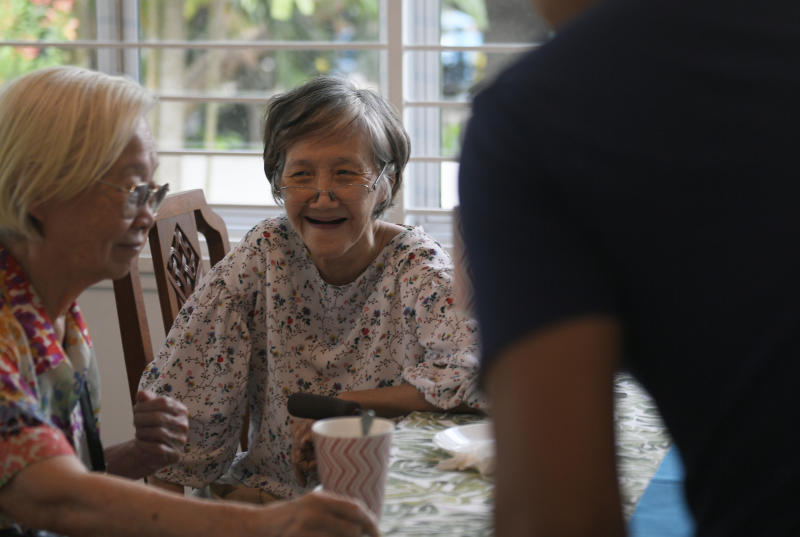Guidelines to set standards of care in assisted living facilities launched
Sign up now: Get ST's newsletters delivered to your inbox

Residents of St Bernadette Lifestyle Village, an assisted living facility, engaging in their activities on Feb 28, 2019.
ST PHOTO: SAHIBA CHAWDHARY
Vanessa Liu
Follow topic:
SINGAPORE - Poor nutrition, inadequately trained staff, substandard hygiene and poorly maintained facilities.
These are among the issues common in assisted living facilities in the United States that prompted Dr Belinda Wee, who is with HCA Hospice Care, to help create standards for the industry in Singapore.
She roped in more than 40 professionals in fields such as healthcare, social work, architecture and technology to put together a guide for operators who want to establish a minimum quality of care for seniors residing in assisted living facilities.
Dr Wee is the founder of Assisted Living Facilities Association (Alfa), a non-profit organisation that advocates assisted living as a model of care for seniors.
The Alfa Good Practice Guide: Dignity And Discerned Autonomy Assisted Living Care Tool was launched on Friday (March 1) at Crossings Cafe in Waterloo Street.
The guidelines not only provide the minimum standard of day-to-day care that the elderly should receive in an assisted living facility, but also cover the operational and financial aspects of running such facilities for the operators.
Assisted living options have been explored in Singapore in recent years as an alternative to nursing homes for seniors who do not require intensive medical and nursing care, but need help with daily living activities, such as preparing meals, showering and dressing.
One example is the integrated HDB project, Kampung Admiralty, which houses 100 flats for the elderly, with a range of social, healthcare and communal facilities, including an active ageing hub and a two-storey medical centre providing specialist outpatient care.
In a project run by the Agency for Integrated Care, seniors living in rental flats in neighbourhoods such as Bedok, Bukit Merah and MacPherson also have access to care workers at senior activity centres in the void decks of their blocks.
The care teams at these centres help the elderly residents with personal care needs, such as bathing and housekeeping, and also monitor their health and provide emotional support.
By 2030, almost one in three people in Singapore will need some form of eldercare service. One in four will be aged 65 and above.
At the launch on Friday (March 1), Dr Chiang Hai Ding, a former MP and a member of PAP Seniors Group, said: "Many seniors go into nursing homes prematurely, that is, before they need to.
"Nursing homes provide long-term medical care to those with disability or disease. For as long as possible, when we don't need 24/7 medical care, we should stay at home and in the community.
"When we need help to live, group homes that provide social care offer a safe alternative to ageing in place, and a better and more economical alternative to nursing homes, " said Dr Chiang, 80.
Ms Joan Pereira, an MP for Tanjong Pagar GRC, suggested in Parliament last month providing more assisted living options in both HDB and private housing developments, such as transforming several combined HDB flats into a senior group home with assisted living facilities.
Dr Paulin Straughan, sociology professor at Singapore Management University, said: "How do you provide a safe and comfortable space for older adults who have disabilities and need help but still maintain their privacy and dignity? I think assisted living as a model of care answers that need - you don't feel like your identity is stripped from you just because you are old and disabled."
At St Bernadette Lifestyle Village, a private assisted living facility, the need for supervision to ensure the safety of its aged residents is balanced with a respect for their privacy.
The facility in Adam Road, set up by Dr Wee, has closed-circuit television cameras only in the common areas, and not in the individual bedrooms of the elderly residents.
Instead, there are motion sensors so that staff can track the movement and activity of the residents in their rooms.
One of the facility's elderly residents, retired Chinese teacher Tong Ying Xian, 80, said: "This facility suits me, because I like my independence.
"I have the freedom to go around the house. I chat with the other seniors when I feel like it, and if I get tired, I just go into my room and immediately I have my own privacy."

